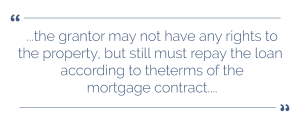Updated on June 20, 2025
What happens after signing a quitclaim deed while you are still on the mortgage for the property? Below we’ll be discussing what this all means and if there are any issues with these scenarios.
Key Takeaways
- Title alone doesn’t cancel debt. Recording a quitclaim deed ends your ownership interest, but the mortgage note—and your personal liability—stay in force until the lender releases or refinances the loan.
- Lender consent is critical. Most deeds of trust in California contain a due-on-sale clause; transferring title without approval can trigger an immediate payoff demand.
- Assumption or refinance is the clean exit. Have the new owner qualify to assume the loan or secure a fresh mortgage so your name—and credit—come off the obligation.
- Credit and insurance still follow you. Missed payments after the quitclaim can damage your score, and some carriers may keep you listed unless you update policies.
- Protect yourself with written agreements. Use an indemnity clause or separate contract requiring the new owner to reimburse you if the lender ever seeks payment from you.
- Get professional guidance early. Reviewing the deed of trust, running a title check, and consulting counsel before you sign avoids costly surprises later.
What is a Quitclaim Deed and What Exactly Does It Transfer?
A quitclaim deed transfers the same interest in a property that the grantor of the quitclaim deed had at the time the grantor signed the deed. Unlike a grant deed, which presumably transfers all rights in the property to the grantee, a quitclaim deed only transfers whatever rights and interests the grantor had at that time. The granter does not even have to know what rights they have in the property if they execute a quitclaim deed – all they are doing is granting whatever they have.
What Is a Mortgage (and Why Does California Use a Deed of Trust Instead?)
In contrast, a mortgage is simply a contract in which a loan is provided to a mortgagee for which a property serves as the security for the repayment of the loan. In California, we use a deed of trust as opposed to a mortgage to reflect to the existence of the loan and a deed of trust is the preferred manner in which loans are secured in California.
What Happens When Signing a Quitclaim Deed but Are Still on the Mortgage?
Knowing the difference between these types of documents provides insight about how they interact.
Most commonly, a property owner may wonder what happens when they sign a quitclaim to transfer their interest in the property, but are still on the mortgage for the property?
The short answer is that the quitclaim deed grantor will still be on the hook for the repayment of the mortgage or deed of trust even though they may no longer be the owner of the property (no longer on title).
In other words, the grantor may not have any rights to the property, but still must repay the loan according to the terms of the mortgage contract.
This gives the lender the option to go after the borrower or the property but generally not both because of the one form of action rule.
Thus, when a property owner decides to sign a quitclaim deed, the property owner should simultaneously arrange for the grantee to assume to the mortgage on the property.
Essentially the grantee assumes the mortgage by agreeing to pay the obligation secured by an existing trust deed or mortgage on the property that is being conveyed.
The one caveat with this arrangement is the owner of the deed of trust (e.g., the bank), will likely need to approve the assumption to ensure that the grantee is financial capable of making the payments (just like when the bank took measures to ensure that the original grantor was credit worthy enough to be entitled to the mortgage).
Thus, any property owner contemplating a quitclaim of their property should keep these issues in mind because simply signing a quitclaim deed does not mean all the accompanying obligations related to the property will automatically pass to the grantee.
Moreover, if you sign a quitclaim deed without informing your lender, the terms of the deed of trust (mortgage) for the property may give the lender the option to call the loan as being immediately due because of the transfer or sale clause in the security instrument.
For help analyzing a past, present or future quitclaim deed in California please do not hesitate to contact us. We constantly litigate title disputes and understand how to avoid them and how to best position our clients for success when they are in the middle of a title dispute. You can call us directly at (310) 954-1877, text us at (310) 706-2265, or send us a message here.
Find Us on Google Maps
FAQs About Quitclaim Deeds, Mortgages, and Related Liabilities
-
Does a quitclaim deed remove me from the mortgage?
- No—the mortgage note binds the borrower, not the title. Until the lender issues a release, refinance, or formal loan assumption, you remain personally liable and your credit is exposed to late-payment reporting.
-
Can my lender call the loan after I record a quitclaim deed?
- Yes. Most California deeds of trust contain a due-on-sale clause that lets the beneficiary demand full payoff when ownership transfers without written consent, even if payments are current.
-
How do I get my name off the loan after a divorce quitclaim?
- The grantee spouse must either assume the existing loan with lender approval or refinance into a new mortgage. Only then will the original borrower’s liability and credit reporting end.
-
Will a quitclaim deed trigger property-tax reassessment in California?
- Generally, yes—Proposition 13 reassessment occurs on most title transfers. Exceptions exist for transfers between spouses or from parent to child when proper exclusion forms are filed.
-
Should the grantee buy title insurance on a quitclaimed property?
- Absolutely. A quitclaim offers no warranties of clear title or lien status. An owner’s title policy protects the new holder from undiscovered liens, boundary disputes, and recording errors.
-
Is gift tax due if I quitclaim property to a relative?
- Possibly. The IRS treats a no-consideration quitclaim as a gift of equity; amounts above the annual exclusion count against your lifetime gift-tax exemption. Consult a tax professional for Form 709 requirements.
-
Can an FHA or VA loan be assumed after a quitclaim deed?
- Yes—both FHA and VA loans are assumable with lender and agency approval, but the new borrower must meet credit and income guidelines, and a release-of-liability form must be signed.
-
Does a quitclaim deed affect my homestead exemption?
- Once you quitclaim, your statutory homestead rights transfer with title, so you lose that creditor protection unless you file a new homestead declaration on another qualifying residence.
-
What happens if liens surface after I accept a quitclaim deed?
- Liens recorded before your deed remain attached to the property and can lead to foreclosure or forced sale. Title insurance or a preliminary lien search is your best defense before acceptance.
-
Can I rescind a quitclaim deed if the grantee stops paying the mortgage?
- Rescission is difficult; courts require proof of fraud, duress, or mutual mistake. Your primary remedy is to pursue the grantee for breach of any indemnity or assumption agreement and keep the loan current to protect your credit.

